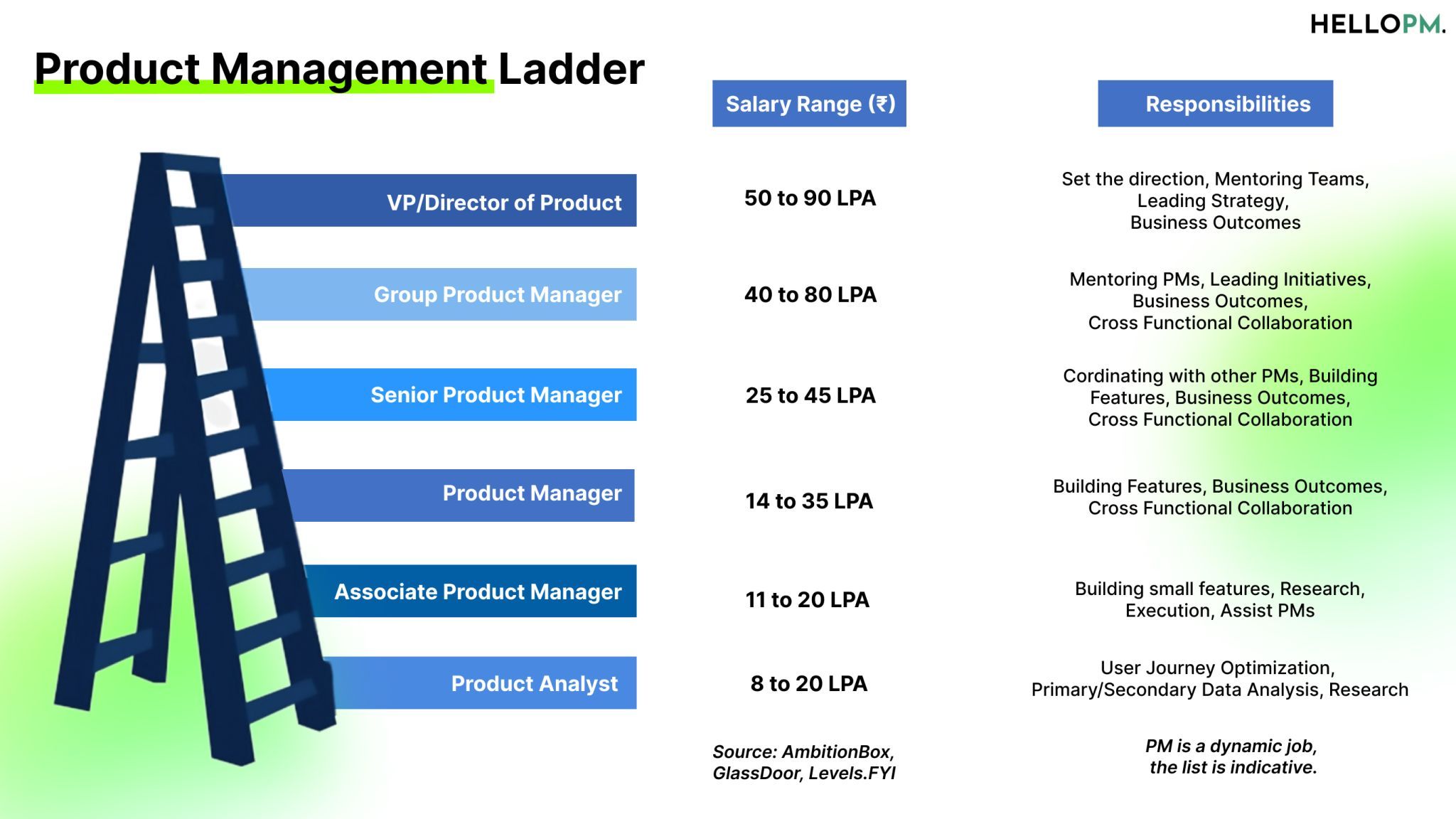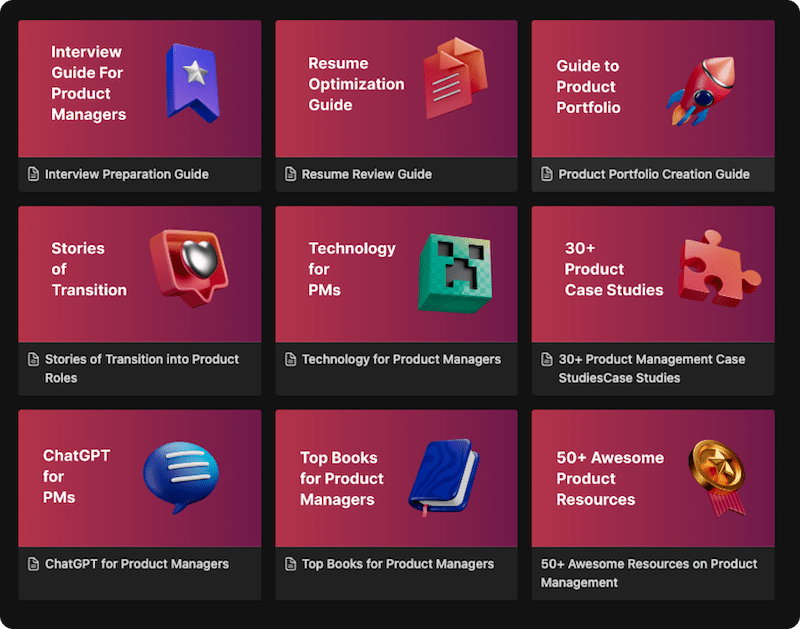Think about your favorite app – the one you use every morning.
Someone decided what features it should have, how the experience should feel, and when each update should roll out. That someone wasn’t just a developer, designer, or marketer – it was likely a Product Manager, quietly orchestrating it all behind the scenes.
In today’s fast-moving tech and startup world, product management has become one of the most impactful and rewarding career paths in India. As businesses race to build better, faster, and smarter, the role of a Product Manager has taken center stage.
And with that rising importance comes higher pay. If you’ve been wondering what the Product Management salary in India looks like in 2025 – or how Product Manager salaries vary by experience, role, and company – this guide has all the answers.
What Does a Product Manager Do?
A Product Manager isn’t just ticking boxes on Jira or deciding what features go live. They’re solving real problems for real people while balancing business goals, team dynamics, and technical constraints. Let’s decode their journey-
1. Start with the user
Great PMs begin with curiosity. They spend time talking to users, digging into data, and asking, “What’s really broken here?”
- Run user interviews and surveys
- Analyze feedback, usage patterns, and market trends
- Spot unmet needs and moments of friction
2. Define the direction
Once the problem’s clear, it’s about setting a bold but realistic direction. One of the crucial questions a Product Manager sets out to answer is “What are we building, and why now?”
- Shape the product vision and long-term strategy
- Set clear goals and metrics
- Align it all with what the business actually cares about
3. Prioritize the Right Problems
You can’t build everything. PMs make hard calls.
- Score features based on impact and effort
- Balance user needs with engineering constraints
- Say “not now” (or “no”) more often than “yes”
4. Rally the team
PMs don’t usually code or design – but they make sure the people who do are set up for success.
- Write clear product briefs and user stories
- Collaborate with design and engineering daily
- Keep the team focused, unblocked, and moving forward
5. Ship the thing
PMs own the delivery, timelines, scope, and quality. When things get messy (and they will), they bring clarity.
- Run sprint planning, reviews, and standups
- Make quick decisions when trade-offs come up
- Keep one eye on launch, the other on impact
6. Learn and iterate
After launch, the work’s not over – it’s time to ask, “Did it actually work?”
- Track adoption, engagement, and performance metrics
- Gather post-launch feedback
- Iterate fast and fix what’s not clicking
7. Keep everyone in sync
Finally, PMs are storytellers. They make sure leadership, marketing, support, and sales all know what’s happening – and why it matters.
- Share updates, decisions, and results
- Align teams across the org
- Translate product work into business outcomes
If you’re tired of building “cool features” that no one uses, it’s time to cut the noise. Learn how to spot what users actually need (before they even ask) with the Jobs to Be Done framework. Tap Here!
Top Factors That Influence Product Manager Salaries in India (2025 Guide)
Not all PM salaries are created equal, and that’s no accident. Your compensation depends on what you’ve built, where you’ve worked, how deeply you’ve owned outcomes, and how well you tell your story.
Let’s break down the biggest levers that shape your Product Management Salary in 2025
1. Your PM Experience Is Your Biggest Equity
In product management, experience isn’t just a number – it’s a narrative. Whether you’re shipping your first MVP or steering company-wide roadmaps, your experience level shapes both your compensation and your responsibilities.
Entry-Level PM Salary (0–2 years)
Fresh PMs stepping into the product world in 2025 can expect to earn between ₹8 lakhs to ₹24 lakhs per annum. This phase is all about learning fast, contributing to small yet meaningful features, and understanding user behavior deeply.
Example: A new PM at startups like Zomato or Swiggy might be closer to the lower end of this range, focusing on user feedback loops, feature requests, and MVPs.
Mid-Level PM Salary (3–7 years)
With more experience comes more responsibility – and higher pay. Mid-level PMs now command salaries between ₹20 lakhs to ₹45 lakhs, depending on the company size, domain, and business impact.
Example: A PM at Flipkart might lead a major feature rollout like a new recommendation engine, or revamp the checkout flow to reduce cart abandonment, for both of which directly influence revenue.
Senior-Level PM Salary (8+ years)
Senior PMs or Group Product Managers bring strong leadership and high-stakes decision-making to the table. In 2025, they earn ₹55 lakhs to ₹90+ lakhs per annum, often including performance bonuses, stock options (ESOPs), and leadership incentives.
Example: A Senior PM at Paytm might oversee the entire UPI or lending product line. Their choices can shift user behavior and market share across millions of customers.
2. Education Helps – But Only if It’s Applied
While PMs don’t need a specific degree to succeed, education can influence starting offers and growth trajectory.
- MBAs from top institutes often boost salaries by 10–15%, especially when paired with a tech or strategy focus.
- Master’s degrees in CS, Data Science, or Design are also valued in product-first companies.
- Certifications (Agile, JTBD, cloud platforms) can signal continuous learning and specialization.
- But more than the degree itself, what really counts is what you build during it – internships, side projects, and hands-on experience. They help you build-
- Build a strong product portfolio
- Improve negotiation power during interviews
- Land higher base salaries and better sign-on bonuses
Tip: Many high-growth PMs in India today come from an engineering + MBA combo, or have upskilled through programs like HelloPM.
3. Your Product Management Skill Stack Shapes Your PM Salary
A good PM is a generalist. A great PM is a generalist with spikes.
- Technical depth pays well: PMs with experience in AI, ML, or system design often earn more, especially in SaaS or deep-tech firms.
- Data-driven thinking is gold: Knowing how to slice data, run A/B tests, and interpret dashboards is no longer optional.
- Methodology mastery matters: Familiarity with Agile, Scrum, and product analytics platforms can tip the scales in your favor.
Bonus? PMs who speak both “user” and “engineering” fluently, in addition to business understanding, often rise faster.
4. Where You’re Based Still Affects Your PM Pay
- Metro hubs like Bangalore, Mumbai, and Delhi-NCR continue to offer the highest packages due to demand density and cost of living.
- Emerging hubs like Pune, Chennai, and Hyderabad are catching up with competitive offers, especially in product and engineering-heavy orgs.
- Remote and hybrid roles are also on the rise, but your location often still anchors the offer, even in a remote-first world.
5. The Scope of Your Product Makes a Difference
Not all PM roles are created equal.
- Complex products = premium pay
Think compliance-heavy finance platforms or AI-driven products. These need deeper understanding and bring higher stakes – and salaries. - Wide scope = higher influence
PMs managing multiple pods, products, or regions usually earn more than those working on isolated features.
The broader your impact, the bigger your leverage.
6. Soft Skills Are Still Your Superpower
You can be a master of roadmaps and metrics, but if you can’t drive alignment or sell a vision, growth gets harder.
Top-paid PMs are almost always:
- Great storytellers
- Calm negotiators
- Collaborative decision-makers
At senior levels, these soft skills often outweigh technical depth.
7. Product Manager Salary by Role: The Track Decides Your Pay
Not all Product Manager roles are cut from the same cloth, and that reflects in how they’re valued. The type of PM you are can significantly influence how companies perceive your impact (and structure your compensation).
Growth Product Managers are the engines behind user acquisition, engagement, and retention. In 2025, their salaries typically start between ₹12 lakhs to ~₹23.5 lakhs.. They run A/B tests, build growth loops, and drive referral campaigns – anything to move metrics like DAUs, sign-ups, or conversion rates. Since they often deliver direct business impact, their compensation reflects the value they unlock through scalable, repeatable wins.
Technical Product Managers sit at the sweet spot between engineering and strategy. Their salaries usually range from ₹15 Lakh to ₹30 lakhs. With deep technical fluency, they guide development teams through complex features, infrastructure decisions, or backend-heavy builds. For instance, a Technical PM at Adobe India might lead AI-powered tool development within the Creative Cloud suite. Their ability to bridge the gap between user needs and technical implementation often commands a premium.
Data Product Managers work at the intersection of product intuition and analytical insight. Starting compensation for them has grown to ₹16 lakhs to ₹22 lakhs annually. They’re the ones who dig into massive datasets, find hidden patterns, and use that intelligence to shape roadmaps, pricing models, or customer journeys. At a company like Ola, a Data PM might analyze ride data to uncover demand hotspots or build better surge algorithms, turning numbers into decisions.
In short, the more specialized your PM role – and the closer it ties to business outcomes – the more leverage you typically have when it comes to salary.
8. Startup or MNC: Your Employer Matters More Than You Think
Where you work as a Product Manager doesn’t just shape your day-to-day – it quietly defines how you’re compensated, recognized, and even how fast you grow.
Imagine this: you join a fast-paced startup. The team is small, the product is still finding its footing, and there are more problems than people to solve them. Your title might be Product Manager, but you’re also part researcher, part growth hacker, part customer support. The base pay might feel modest – say, somewhere between ₹10 to ₹32 lakhs per year – but that’s only half the story. You’re likely offered equity through ESOPs, and if the startup raises a Series B or exits, those stock options could grow significantly in value. It’s not just a job – it’s a bet on something bigger, and you’re right in the middle of it.
Now, picture the flip side. You’re a PM at a global company – maybe Microsoft, Amazon, or Adobe. Your product touches millions, and your team might span time zones. The compensation here? It’s structured, predictable, and often quite generous. A Senior PM might draw a ₹40 lakh base, with another ₹10–15 lakhs in bonuses, plus ₹15 lakhs in stock grants. You still solve tough problems, but you do it at scale, with support systems in place and well-defined career paths ahead of you.
One environment rewards chaos and creation. The other rewards the scale and stability.
And as a PM, your compensation is as much about the kind of value you create as it is about where you create it.
9. Product Manager Salaries by Industry in India: Who’s Paying What?
Even if two PMs have the same skills, experience, and energy, what they earn can differ dramatically based on the industry they’re in. That’s because some sectors live and breathe product thinking, while others are only starting to embrace it.
In India, Product Managers are no longer confined to just tech startups or SaaS unicorns. Today, they’re building everything from life-saving health platforms to immersive media experiences. And each industry comes with its own challenges – and its own compensation structure.
Take healthcare and pharma, for example. It’s not just about building beautiful interfaces – it’s about designing with precision, regulation, and patient outcomes in mind. A PM working on a diagnostics platform or compliance-heavy healthtech product typically earns between ₹14 to ₹32 LPA – a range that reflects the weight of that responsibility.
In banking and fintech, the stakes are just as high. You’re building secure, user-first financial products that people trust with their money. Whether it’s a lending engine or a digital wallet, salaries here usually fall between ₹16 to ₹30 LPA – with performance bonuses common in digital-first setups.
Meanwhile, edtech has opened up a whole new lane for PMs. Here, you’re solving for access, scale, and experience – all at once. If you’re building inclusive learning tools or mobile-first classrooms, you’re looking at compensation between ₹12 and ₹26 LPA, depending on the company’s maturity and reach.
Then there’s media and entertainment, where PMs are behind the scenes of OTT platforms, live-streaming apps, and games that millions interact with daily. These roles typically sit in the ₹16 to ₹32 LPA range, especially when personalization and content discovery are critical.
And of course, e-commerce and retail – the full-stack playground. From optimizing the checkout flow to managing backend logistics, PMs here influence everything from UX to delivery timelines. Salaries range from ₹14 to ₹28 LPA, reflecting the scope of ownership across both the customer journey and the supply chain.
What’s changing across the board is this:
Industries that once saw product management as a support function are now placing it at the heart of their strategy. From pharma to logistics, from manufacturing floors to digital banks – companies are undergoing deep transformation. And they’re leaning on skilled Product Managers to make it happen: to modernize systems, reimagine user journeys, and translate real-world pain points into scalable solutions.
And just as this shift was picking up speed, in came AI.
Suddenly, everything changed.
Today’s PMs aren’t just managing roadmaps – they’re shaping what the problem even is, long before the first design is drafted or the first line of code is written. Whether it’s using AI to uncover unmet user needs or launching intelligent features, Product Managers are becoming central to how the future gets built.
All in all, in 2025, product isn’t just a growth career. It’s a high-impact one.
Want to be an AI Product Manager?
Whether you’re a developer, marketer, designer, or student trying to find your way into product, you’re not alone in this journey.
Take Prabhav – once a full-time coder, now a Product Manager at a fast-growing tech company. He made the leap confidently through a structured, cohort-based experience with HelloPM – a learning platform built by PMs, for future PMs.
Whether you’re aiming to become an AI Product Manager or just exploring how product can become your next chapter, check out this video. It might just be the start of something transformative.
How to Earn More as a Product Manager (Without Burning Out)
Let’s be honest – there’s no magic button that raises your paycheck. But if you look closely at the top-paid Product Managers today, they all have something in common: they never stopped learning, they know their niche, and they show up with clarity and confidence when it matters most.
Here’s what that looks like in practice:
1. Stay Curious, Stay Current
The world of product is evolving fast, with AI tools, product analytics platforms, no-code experiments, and new frameworks showing up every quarter. If you’re already a PM, the best way to stay relevant (and well-compensated) is to continuously upskill. Learn what’s new, try what’s next, and don’t just manage products – reimagine them.
2. Specialize in What the Market Needs
Not every PM doesn’t needs to know everything. But the ones who go deep in high-demand sectors – like fintech, healthtech, SaaS, or AI – often stand out. Why? Because specialization signals clarity and competence. It shows you know the user, the problem space, and the landscape.
3. Build Your Circle
Networking isn’t just for job-hunting. The best insights, referrals, salary benchmarks, and tool recommendations come from other PMs – the ones sharing their wins, lessons, and hiring needs in real-time. Whether it’s a LinkedIn community, a WhatsApp group, or a weekend cohort, staying connected keeps you informed and visible.
4. Know Your Worth – and Say It Out Loud
Negotiation isn’t just about confidence. It’s about preparation. When you know the average compensation for your role, your skillset, and your geography, and you can explain how you’ve driven impact, you have leverage. And the courage to use it.
Already, I’m a Product Manager?
Then it’s time to upgrade yourself. Dive into product strategy, AI, JTBD, no-code prototyping, or storytelling frameworks. The PMs who grow fastest in 2025 aren’t the busiest – they’re the ones who learn smart and build intentionally.
At HelloPM, we help you do just that – through cohort-based learning, live projects, and deep dives into modern PM tools and thinking.
Whether you’re breaking in or breaking through, we’ve got your back.
In One Line: There’s No One Salary – Only Your Own Story
Where you start matters. But how you learn, build, negotiate, and grow – that’s what shapes your path.
Frequently Asked Questions (FAQs)
As of 2025, the average salary for a Product Manager in India ranges between ₹20 to ₹35 lakhs per annum, depending on experience, company size, and industry. Entry-level roles start around ₹10–₹20 LPA, while senior PMs can earn ₹45 LPA or more.
Top-paying companies include: Google (India), Amazon, Flipkart, Microsoft, Paytm, Razorpay, PhonePe, Adobe.
These companies offer packages ranging from ₹30 lakhs to ₹1 crore, including bonuses and stock options.
Yes. An MBA from a reputed B-school like ISB, IIM, or global institutes often boosts starting salaries by 10–20%. It also helps candidates secure PM roles in top-tier companies or get fast-tracked into leadership tracks.
Startups offer salaries between ₹10–30 LPA, along with ESOPs (stock options) that can grow in value over time.
MNCs and unicorns pay ₹25–60 LPA, with added benefits like performance bonuses, health coverage, and restricted stock units (RSUs).
Yes. Technical Product Managers and Data Product Managers usually earn higher salaries due to their ability to bridge tech and business. Starting salaries often range from ₹14–24 LPA, with senior roles exceeding ₹45–50 LPA.
To earn more, PMs should develop:
(i) Strong product thinking and business acumen
(ii) Technical fluency (APIs, system design basics)
(iii) Data analysis and experimentation skills
(iv) User research and UX knowledge
(v) Team leadership and stakeholder management
Certifications and hands-on project experience also boost earning potential.
Yes. Experienced PMs sometimes move into product consulting, especially in startups, SaaS, or D2C brands, earning project-based fees or retainers that may exceed ₹2–4 lakhs per month depending on scope and domain.
Absolutely. With India’s booming tech, fintech, and digital economy, product management is one of the most future-proof and high-growth careers. Salaries, career paths, and global opportunities are steadily increasing.

 WATCH HELLOPM COHORT IN ACTION
WATCH HELLOPM COHORT IN ACTION



One thought on “Product Manager Salary in India: A Comprehensive Guide”
Comments are closed.